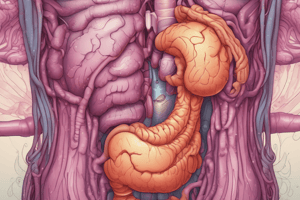Podcast
Questions and Answers
What are the two major groups of inflammatory bowel disease?
What are the two major groups of inflammatory bowel disease?
- Crohn's disease and Gastroenteritis
- Ulcerative colitis and Gastritis
- Crohn's disease and Ulcerative colitis (correct)
- Crohn's disease and Irritable bowel syndrome
Which part of the gastrointestinal tract does Crohn's ileitis affect?
Which part of the gastrointestinal tract does Crohn's ileitis affect?
- Esophagus and stomach
- Ileum only (correct)
- Large intestine only
- Stomach and small intestine
What is another name for Crohn's disease?
What is another name for Crohn's disease?
- Irritable bowel syndrome
- Acute gastritis
- Gastroenteritis
- Granulomatous colitis (correct)
What is the main cause of inflammatory bowel disease?
What is the main cause of inflammatory bowel disease?
Which type of Crohn's disease affects both the ileum and the large intestine?
Which type of Crohn's disease affects both the ileum and the large intestine?
What age range does the onset of Crohn's disease typically occur?
What age range does the onset of Crohn's disease typically occur?
Which part of the gastrointestinal tract does Crohn's disease affect?
Which part of the gastrointestinal tract does Crohn's disease affect?
Which type of Crohn's disease affects both the ileum and the large intestine?
Which type of Crohn's disease affects both the ileum and the large intestine?
What is the typical age range for the onset of Crohn's disease?
What is the typical age range for the onset of Crohn's disease?
What is the characteristic feature of Crohn's disease?
What is the characteristic feature of Crohn's disease?
What is another name for Crohn's disease?
What is another name for Crohn's disease?
Which age group is commonly affected by the onset of Crohn's disease?
Which age group is commonly affected by the onset of Crohn's disease?
Which part of the gastrointestinal tract does Crohn's ileitis specifically affect?
Which part of the gastrointestinal tract does Crohn's ileitis specifically affect?
What is the common classification of Crohn's disease based on the affected areas?
What is the common classification of Crohn's disease based on the affected areas?
What is the major cause of Crohn's disease?
What is the major cause of Crohn's disease?
Flashcards are hidden until you start studying
Study Notes
Inflammatory Bowel Disease: Crohn's Disease Overview
- Inflammatory bowel disease is a chronic condition of the gastrointestinal tract caused by the immune response to the commensal microflora.
- It is divided into two major groups: Crohn's disease and ulcerative colitis.
- Crohn's disease, also known as granulomatous colitis and regional enteritis, is a type of inflammatory bowel disease characterized by the body's immune system attacking the gastrointestinal tract, leading to transmural inflammation.
- The disease can affect any part of the gastrointestinal tract from the mouth to the anus.
- Onset of Crohn's disease typically occurs between the ages of 15-30, and it affects males and females equally.
- Gastroenterologists categorize presenting disease by the affected areas, with ileocolic Crohn's disease affecting both the ileum and the large intestine, accounting for 50% of cases.
- Crohn's ileitis, which affects the ileum only, accounts for 30% of cases.
- Crohn's disease is a chronic condition that requires ongoing management and can lead to complications such as strictures, fistulas, and abscesses.
- Common symptoms of Crohn's disease include abdominal pain, diarrhea, weight loss, and fatigue.
- Treatment for Crohn's disease often involves a combination of medication, lifestyle changes, and in some cases, surgery.
- Patients with Crohn's disease may benefit from working closely with a healthcare team, including gastroenterologists, nutritionists, and mental health professionals.
- Research into the causes and potential treatments for Crohn's disease is ongoing, with a focus on understanding the role of the immune system and the microbiome in disease development.
Studying That Suits You
Use AI to generate personalized quizzes and flashcards to suit your learning preferences.



